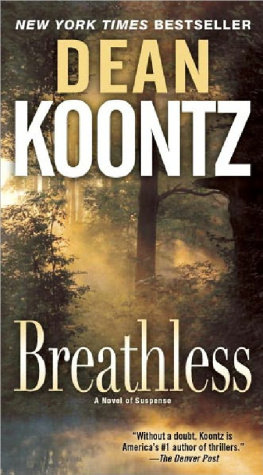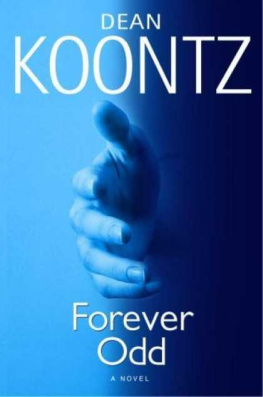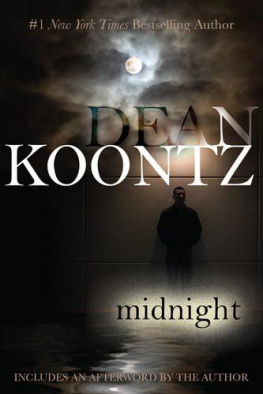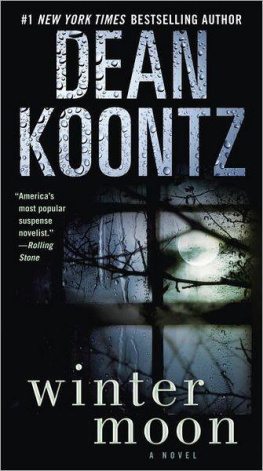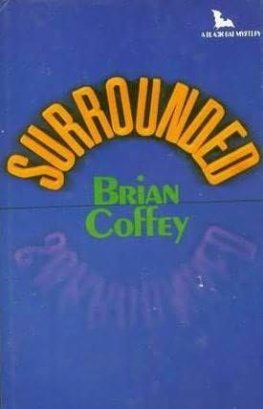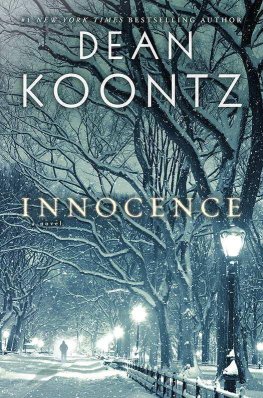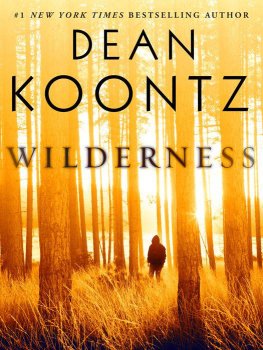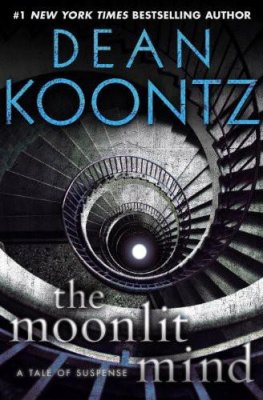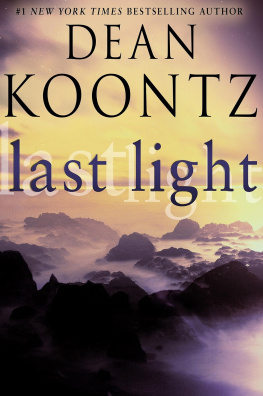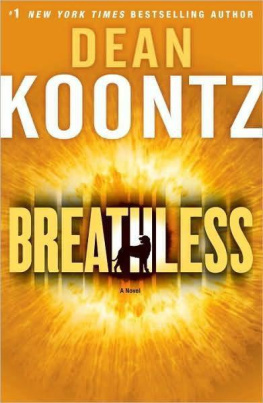


Breathless is a work of fiction. Names, characters, places, and incidents either are the product of the authors imagination or are used fictitiously. Any resemblance to actual persons, living or dead, events, or locales is entirely coincidental.
Copyright 2009 by Dean Koontz
Title page art from an original photograph by Thomas Buttler All rights reserved.
Published in the United States by Bantam Books,
an imprint of The Random House Publishing Group,
a division of Random House, Inc., New York.
Bantam Books is a registered trademark of Random House, Inc., and the colophon is a trademark of Random House, Inc.
Koontz, Dean R. (Dean Ray).
Breathless : a novel / Dean Koontz.
p. cm.
eISBN: 978-0-553-90714-8
1. CarpentersFiction. 2. VeterinariansFiction. 3. QuarantineFiction. 4. MammalsColoradoFiction. 5.
ColoradoFiction. I. Title.
PS3561.O55B74 2009
813.54dc22
2009036959
www.bantamdell.com
ALSO BY DEAN KOONTZ
Relentless Your Heart Belongs to Me Odd Hours
The Darkest Evening of the Year The Good Guy Brother OddThe Husband Forever Odd Velocity Life ExpectancyThe Taking Odd Thomas The Face By the Light of the MoonOne Door Away From Heaven From the Corner of His EyeFalse Memory Seize the Night Fear Nothing Mr. MurderDragon Tears Hideaway Cold Fire The Bad Place MidnightLightning Watchers Strangers Twilight Eyes Darkfall PhantomsWhispers The Mask The Vision The Face of Fear Night ChillsShattered The Voice of the Night The Servants of TwilightThe House of Thunder The Key to Midnight
The Eyes of Darkness Shadowfires Winter Moon
The Door to December Dark Rivers of the Heart IceboundStrange Highways Intensity Sole Survivor
Ticktock The Funhouse Demon Seed
DEAN KOONTZS FRANKENSTEIN
Book One: Prodigal Son
Book Two: City of Night
Book Three: Dead and Alive





To Aesop, twenty-six centuries
late and with apologies
for the length.
And as always and forever
to Gerda
Science must not impose any philosophy, any more than the telephone must tell us what to say.
G. K. CHESTERTON
PART ONE
Life and Death
One
A moment before the encounter, a strange expectancy overcame Grady Adams, a sense that he and Merlin were not alone.
In good weather and bad, Grady and the dog walked the woods and the meadows for two hours every day. In the wilderness, he was relieved of the need to think about anything other than the smells and sounds and textures of nature, the play of light and shadow, the way ahead, and the way home.
Generations of deer had made this path through the forest, toward a meadow of grass and fragrant clover.
Merlin led the way, seemingly indifferent to the spoor of the deer and the possibility of glimpsing the white flags of their tails ahead of him. He was a three-year-old, 160-pound Irish wolfhound, thirty-six inches tall, measured from his withers to the ground, his head higher on a muscular neck.
The dogs rough coat was a mix of ash-gray and darker charcoal. In the evergreen shadows, he sometimes seemed to be a shadow, too, but one not tethered to its source.
As the path approached the edge of the woods, the sunshine beyond the trees suddenly looked peculiar.
The light turned coppery, as if the world, bewitched, had revolved toward sunset hours ahead of schedule. With a sequined glimmer, afternoon sun shimmered down upon the meadow.
As Merlin passed between two pines, stepping onto open ground, a vague apprehensiona presentiment of pending contactgripped Grady. He hesitated in the woodland gloom before following the dog.
In the open, the light was neither coppery nor glimmering, as it had appeared from among the trees.
The pale-blue arch of sky and emerald arms of forest embraced the meadow.
No breeze stirred the golden grass, and the late-September day was as hushed as any vault deep in the earth.
Merlin stood motionless, head raised, alert, eyes fixed intently on something distant in the meadow.
Wolfhounds were thought to have the keenest eyesight of all breeds of dogs.
The back of Gradys neck still prickled. The perception lingered that something uncanny would occur.
He wondered if this feeling arose from his own intuition or might be inspired by the dogs tension.
Standing beside the immense hound, seeking what his companion saw, Grady studied the field, which gently descended southward to another vastness of forest. Nothing moved until something did.
A white form, supple and swift. And then another.
The pair of animals appeared to be ascending the meadow less by intention than by the consequence of their play. They chased each other, tumbled, rolled, sprang up, and challenged each other again in a frolicsome spirit that could not be mistaken for fighting.
Where the grass stood tallest, they almost vanished, but often they were fully visible. Because they remained in motion, however, their precise nature was difficult to define.
Their fur was uniformly white. They weighed perhaps fifty or sixty pounds, as large as midsize dogs.
But they were not dogs.
They appeared to be as limber and quick as cats. But they were not cats.
Although hed lived in these mountains until he was seventeen, though he had returned four years previously, at the age of thirty-two, Grady had never before seen creatures like these.
Powerful body tense, Merlin watched the playful pair.
Having raised him from a pup, having spent the past three years with little company other than the dog, Grady knew him well enough to read his emotions and his state of mind. Merlin was intrigued but puzzled, and his puzzlement made him wary.
The unknown animals were large enough to be formidable predators if they had claws and sharp teeth.
At this distance, Grady could not determine if they were carnivores, omnivores, or herbivores, though the last classification was the least likely.
Merlin seemed to be unafraid. Because of their great size, strength, and history as hunters, Irish wolfhounds were all but fearless. Although their disposition was peaceable and their nature affectionate, they had been known to stand off packs of wolves and to kill an attacking pit bull with one bite and a violent shake.
When the white-furred creatures were sixty or seventy feet away, they became aware of being watched.
They halted, raised their heads.
The birdless sky, the shadowy woods, and the meadow remained under a spell of eerie silence. Grady had the peculiar notion that if he moved, his boots would press no sound from the ground under him, and that if he shouted, he would have no voice.
To get a better view of man and dog, one of the white creatures rose, sitting on its haunches in the manner of a squirrel.
Grady wished he had brought binoculars. As far as he could tell, the animal had no projecting muzzle; its black nose lay in nearly the same plane as its eyes. Distance foiled further analysis.
Next page
